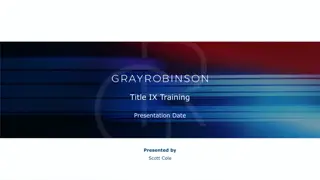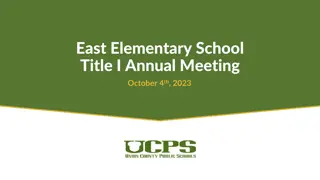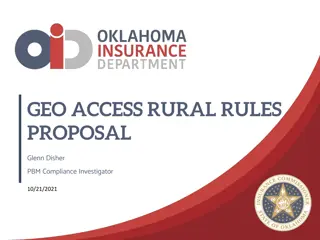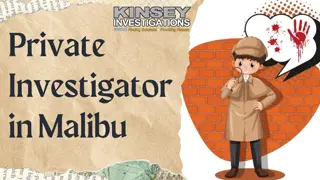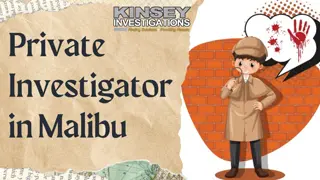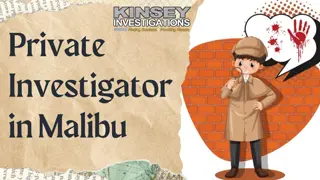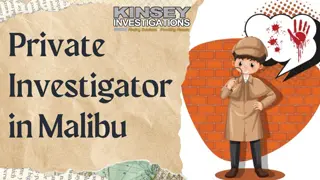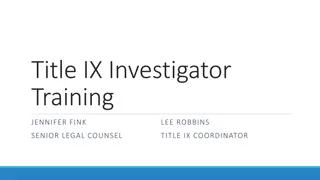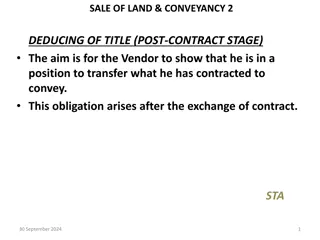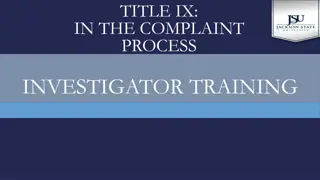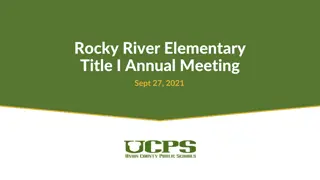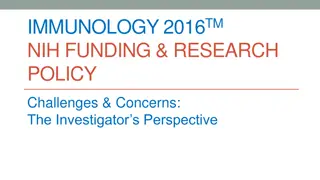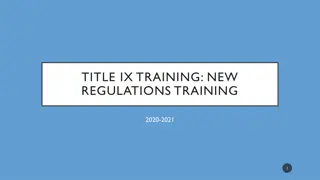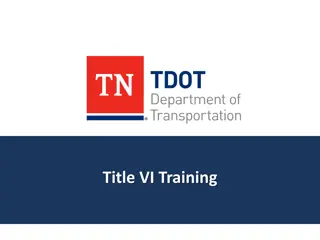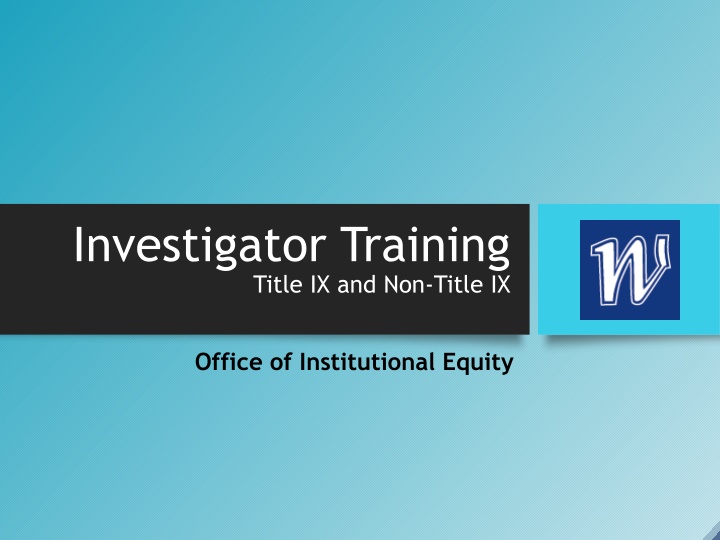
Title IX and Investigator Training in Institutional Equity
Explore the essentials of Title IX in addressing discrimination in education, focusing on sexual harassment and violence. Discover the responsibilities of colleges in investigating and mitigating violations, including the three-pronged approach to defining sexual harassment.
Uploaded on | 1 Views
Download Presentation

Please find below an Image/Link to download the presentation.
The content on the website is provided AS IS for your information and personal use only. It may not be sold, licensed, or shared on other websites without obtaining consent from the author. If you encounter any issues during the download, it is possible that the publisher has removed the file from their server.
You are allowed to download the files provided on this website for personal or commercial use, subject to the condition that they are used lawfully. All files are the property of their respective owners.
The content on the website is provided AS IS for your information and personal use only. It may not be sold, licensed, or shared on other websites without obtaining consent from the author.
E N D
Presentation Transcript
Investigator Training Title IX and Non-Title IX Office of Institutional Equity
Course Objectives Understanding Title IX & What it Addresses Investigation Expectations Interview Processes Interviewing Tips for Success Best Practices Investigator Don ts Building the Investigative File Understanding Relevancy Weighing the Evidence Importance of Impartiality Recognizing Biases and Stereotypes Burden of Proof & Understanding where it Rests Title IX Grievance Process
Understanding Title IX & What it Constitutes
Title IX of the Education Amendments Act of 1972 As defined: No person in the United States shall, on the basis of sex, be excluded from participation in, be denied the benefits of, or be subjected to discrimination under any education program or activity receiving Federal financial assistance."
Title IX addresses Title IX addresses: Sexual Harassment and Sexual Violence in Education Equal opportunity in educational programs Discrimination based on pregnancy It is the College s responsibility to take immediate steps to address any violations by investigating the allegations.
Sexual Harassment Defined Title IX utilizes a three-pronged approach, meaning for sexual harassment to occur, one or more of the following must apply: (1) An employee of the recipient conditioning the provision of an aid, benefit, or service of the recipient on an individual s participation in unwelcome sexual conduct; (2) Unwelcome conduct determined by a reasonable person to be so severe, pervasive, and objectively offensive that it effectively denies a person equal access to the recipient s education program or activity; or (3) Sexual assault as defined in 20 U.S.C. 1092(f)(6)(A)(v), dating violence as defined in 34 U.S.C. 12291(a)(10), domestic violence as defined in 34 U.S.C. 12291(a)(8), or stalking as defined in 34 U.S.C. 12291(a)(30).
Meaning of Prong 1 An employee of the recipient conditioning the provision of an aid, benefit, or service of the recipient on an individual s participation in unwelcome sexual conduct Quid Pro Quo This for that One incident is sufficient to initiate a Title IX grievance process
Meaning of Prong 2 Unwelcome conduct determined by a reasonable person to be so severe, pervasive, and objectively offensive that it effectively denies a person equal access to the recipient s education program or activity. Third Party Sexual conduct which is welcomed and reciprocated but creates a hostile environment for others. Sexual Favoritism Sexual conduct that is welcomed and reciprocated, but results in unfair treatment of others. Sex-Based Any harassing conduct which is based on gender can constitute sexual harassment. Hostile Environment jokes, images, posters, slurs, derogatory comments, etc. that involve sexual content. This behavior is so frequent or serious that it effectively denies a person equal access to the educational program or activity.
Meaning of Prong 3 Sexual assault as defined in 20 U.S.C. 1092(f)(6)(A)(v), dating violence as defined in 34 U.S.C. 12291(a)(10), domestic violence as defined in 34 U.S.C. 12291(a)(8), or stalking as defined in 34 U.S.C. 12291(a)(30). Title IX now considers acts of Sexual Violence to be under the umbrella of Sexual Harassment. One incident is sufficient to initiate a Title IX grievance process
Title IX Jurisdiction For the alleged conduct to be considered within the authority of Title IX it must occur: Within the United States of America If the alleged incident took place outside of the United States, it will be considered a Non-Title IX incident. Within WNC s educational program or activity The alleged act must occur within the scope of a WNC program or sponsored event. For example, the alleged incident occurred during WNC soccer game and it involved two WNC student-athletes. This example would be considered a Title IX incident. For example, the alleged incident took place at a non-WNC affiliated residence between two fellow WNC Students that happen to be roommates. This example would be considered a Non-Title IX incident because it did not occur within the scope an educational program, activity, or facility.
Title IX Grievance Process Authorization For a Title IX grievance process to be authorized the following must occur: The alleged conduct satisfies one or more of the three pronged requirements listed within Title IX s definition of Sexual Harassment. The alleged conduct occurred within the United States The alleged conduct occurred within WNC educational program or activity. If the alleged incident does not meet the above, then the Title IX Grievance Process is Not Authorized. However, this does NOT mean WNC will take no action. If the Title IX Grievance Process is not authorized, at the discretion of OIE, then the incident may be investigated utilizing the Non-Title IX grievance procedure list in Title 4, Chapter 8, Section 13 of the NSHE Board of Regents Handbook.
Investigations As an investigator, you must always remember that you have no side other than the integrity of the process. -Unknown
Investigations WNC requires that all investigations, both Title IX and Non-Title IX be: Prompt Impartial Thorough Objective Equitable
Timeliness of the Investigation WNC has the responsibility of conducting a prompt, thorough, impartial, and equitable investigation and resolution of the complaint. Title 4, Chapter 8, Section 13, of the Board of Regents Handbook states; an investigation should be completed within a reasonable time from receipt of the complaint or information about the conduct.
Interview Process Order of Interviews The usual order for interviewing is the Complainant, the Respondent, and witnesses. This is determined on a case by case basis. Re-interviewing if necessary. Introduction of Interview, explain: The purpose of meeting with them. The Process of Investigation, your role as a fair/impartial fact gatherer, and any privacy protections. The seriousness of the investigation. Their specific role in the investigation, i.e. as a witness. Importance of their cooperation and honesty. Explain and stress no retaliation. Format for Interview Notes Date & Time/Location/Individuals Present/Note any follow up Items. Record facts/observations not speculation/conclusions Don t make legal conclusions.
Successful Tips for Interviewing If necessary, slow down the person being interviewed to allow for accurate note taking. If statement is based on a rumor or second-hand information; document in the notes. Establish rapport: Create a comfortable, respectful, professional atmosphere. Ask the easy questions first save the difficult ones for last. Ask short, open ended questions i.e., and then what happened next? Do not ask legal questions this is an administrative investigation, not a criminal investigation. Stay on task and within the purview of the investigation. Ask Is there anything else I should know? Always be professional, gather the facts, make no judgments, and make no statements or comments about any of the other parties.
Interview Best Practices Outline your interview questions. Be flexible sometimes the interviews may take an unexpected turn and you will have to ask questions differently then prepared. Be detailed in your questions and be sure to get the answers. It is always beneficial to have two investigators present. Two sets of ears and notes can make a difference in gathering & processing the evidence. A team of investigators may help to ensure that your investigation meets these requirements of being prompt, thorough and impartial; and to ensure the maximum amount of relevant information available is collected. Who investigates may be strategic to each specific case. Ability to brainstorm investigation steps and lines of questioning. Be cognizant of the difference between rumor and fact.
Interview Best Practices Continued Ask who else you should talk to (witnesses) and ask for any pertinent documentation (i.e. texts, emails, cards, notes, photos, etc.) Let parties know you may need to follow up with them as the investigation progresses (additional interviews or requests for information). Discuss retaliation and the consequences of engaging in the behavior.
Complainant Interview The individual(s) who is alleged to be the victim of conduct. Explain & provide a copy of the process of investigation and any relevant information. Inform them that the complaint will be shared with the Respondent. Acknowledge the difficulty of reporting and thank them for coming forward. Ask them to share in detail a complete account of what occurred. Ask if there are any witness(s) they would like interviewed who may have pertinent information to the case. Ask if they have any pertinent evidence to provide such as blogs, social media, text messages, emails, etc. Before the conclusion of the interview, review your notes and clarify anything that is uncertain. Ask what they hope to see as a remedy to the complaint. Find out if their academics and/or work have been affected and assist in providing supportive measures. Discuss retaliation and inform them that the Respondent will also be advised not to retaliate. Inform the complainant that they can contact you anytime with questions or any situation that may arise.
Respondent Interview The individual(s) alleged to be the perpetrator of the conduct. Explain & provide a copy of the process of investigation and any relevant information. Acknowledge the difficulty of the situation and thank them for meeting with you. Provide a confidential copy of the complaint and ask them to respond verbally to the allegations. This is accomplished by thoroughly questioning them with a combination of open and closed ended questions pertaining to the allegations. Ask if there are any witness(s) they would like interviewed who may have pertinent information to the case. Ask if they have any pertinent evidence to provide such as blogs, social media, text messages, emails, etc. Request a written response to the allegations and give due date. Before the conclusion of the interview, review your notes and clarify anything that is uncertain. Let the Respondent know how they will hear from you next. Provide (CAPS or Employee Assistance) counseling options. Discuss retaliation and any consequences of the behavior or actions. Inform the complainant that they can contact you anytime with questions or any situation that may arise.
Witness Interview The individual(s) that have or could potentially have information related and/or relevant to the alleged incident. Thank the witness for participating in the process. Inform them that there has been a complaint and that questions will be asked pertaining to the allegations. Establish the relationship to the other parties in the case. Ask specific questions and address the need for truthfulness. Ask if they have been contacted by one of the parties. Ask if there is anything other information that they can provide. Before the conclusion of the interview, review your notes and clarify anything that is uncertain. Explain retaliation and ask them to contact us if they experience the behavior by one of the parties for their involvement. Discuss the importance of confidentiality.
Interviewers Donts Do not use rumor or second-hand information as fact. Do not lead the interviewee or put words into their mouths. The complainant is not always right. Do not make judgments Do not make statements or comments about any of the parties. Do not be accusatory or hostile toward the interviewee. Do not make the interview personal; the investigator has no stake in the case other than investigating fairly and impartially. Do not sway the evidence toward a personal belief. Do not discuss personal experiences with the interviewee. It is about them, not the investigator. All these actions could create a huge liability for the institution.
Investigative File File Assemble an investigative file and keep it in a secure location. Set up the data base and any electronic file system used in conjunction to the paper file. Keep an accurate and detailed case log of the steps in the process. Notating date, time, description and investigators initials. Communications sent to all parties/witnesses Copies of all pertinent evidence and materials collected. Copy of Investigative report Investigative Notes Notes should be complete, accurate, and detailed. When possible, include verbatim statements concerning critical issues. Notate in the notes what is told to the complainant, respondent and witnesses by the investigator(s). Documentation is critical: you are creating the record of the complaint.
Requirements of the Title IX Investigator
The Title IX Investigator must: Understand relevancy Understand restrictions regarding questions asked Understand consent Be aware of any necessary accommodations Understand how to weigh the evidence Serve Impartially Recognize bias and stereotypes Understand where the burden of proof rests
Relevance Relevant means a question or evidence having any tendency to make the existence of any fact that is of consequence to the determination of the action more or less probable than it would be without the question or evidence. (Title 4, Chapter 8, Section 13). The Title IX Investigator must consider the relevancy of questions and evidence, both inculpatory and exculpatory Inculpatory: causing blame; to be imputed; to incriminate. Evidence favorable to the complainant. Exculpatory: anything that clears someone or something of guilt. Evidence favorable to the respondent.
Questions NOT to ask At NO time will questions be asked regarding information that is protected under a legally recognized privilege. This applies to all interviews in the Title IX Grievance Procedure. Doctor-Patient confidentiality Attorney-Client privilege FERPA or HIPPA Etc. Questions and evidence about the complainant s sexual predisposition or prior sexual behavior are NOT relevant, unless such questions and evidence about the complainant s prior sexual behavior are offered to prove that someone other than the respondent committed the conduct alleged by the complainant, or if the questions and evidence concern specific incidents of the complainant s prior sexual behavior with respect to the respondent and are offered to prove consent.
Consent Conduct is unwelcome if it is done in the absence of consent. Consent means an affirmative, clear, unambiguous, knowing, informed, and voluntary agreement between all participants to engage in sexual activity. Consent is active, not passive. Silence or lack of resistance cannot be interpreted as consent. Seeking and having consent accepted is the responsibility of the person(s) initiating each specific sexual act regardless of whether the person initiating the act is under the influence of drugs and/or alcohol. The existence of a dating relationship or past sexual relations between the participants does not constitute consent to any other sexual act. Affirmative consent must be ongoing throughout the sexual activity and may be withdrawn at any time. When consent is withdrawn or cannot be given, sexual activity must stop. Consent cannot be given when it is the result of any coercion, intimidation, force, deception, or threat of harm. Consent cannot be given when a person is incapacitated. Incapacitation occurs when an individual lacks the ability to fully, knowingly choose to participate in sexual activity. Incapacitation includes impairment due to drugs or alcohol (whether such use is voluntary or involuntary); inability to communicate due to a mental or physical condition; the lack of consciousness or being asleep; being involuntarily restrained; if any of the parties are under the age of 16; or if an individual otherwise cannot consent. The definition of consent does not vary based upon a participant s sex, sexual orientation, gender identity or gender expression. Title 4 Chapter 8 Section 13
ADA Compliance The Investigator is responsible for ensuring any interview is ADA Compliant. If any individual participating in an interview needs an accommodation, then the accommodation will be provided, within reason.
Types and Weight of Evidence Direct: Supports the case exactly. Video surveillance showing the respondent s actions. Legally obtained / admissible audio recordings that capture the sexual remarks. Alleged incident witnessed by multiple others and all give same statement. Respondent admits to conducting the alleged behavior/act. This is the best type of evidence, with great weight given when determining responsibility. Corroborating: Evidence that supports other evidence. There was a witness present during the incident and their statement supports either the complainant or respondent. emails/texts/photos/etc., which supports either the complainant or respondent. This is the second best type of evidence, with good weight given when determining responsibility.
Types and Weight of Evidence Continued Character: NOT useful. No weight is given. Circumstantial: Evidence can be used to INFER but not PROVE a conclusion. Opposite of Direct. Alleged patterned evidence. i.e., the respondent has allegedly conducted the same behavior in the past. Controversial; Just because an individual has done it in the past, does not prove they committed the act or behavior this time. Hearsay; They were told by another individual that a person committed the act or behavior; or One party said the other did this, the other party said they did not (No corroborating evidence). In Title IX Grievance Procedure, determinations are NOT to be made based on inference. No weight is given He/she good person/bad apple. Demeanor during interview /live-hearing. He/she is creepy, so they definitely committed the act or behavior.
Burden of Proof The Burden of Proof rests upon WNC The burden of proof and the burden of gathering evidence sufficient to reach a determination regarding responsibility rests upon WNC and not on the reporting parties. The evidentiary standard of Preponderance is to be used upon making a determination. Preponderance of the evidence means the evidence establishes that it is more likely than not that the prohibited conduct occurred (i.e., 50% plus a feather).
Being Impartial There can be no conflicts of interest. If there is a conflict of interest, then one can not be the Title IX Investigator. The Title IX Investigator can not be for or against complainants or respondents generally or an individual complainant or respondent. If a complainant is given an opportunity, then the respondent must be given the same opportunity and vice versa. The Title IX Investigator will avoid prejudgment of the facts at issue. The Title IX Investigator will treat all parties the same regardless of their status as a complainant, respondent, or witness. The Title IX Investigator must keep in mind that the respondent is not responsible for the alleged conduct until a determination regarding responsibility is made at the conclusion of the complaint process. The Title IX Investigator will be free of bias and avoid making decisions based on stereotypes. Examples of biases and sex stereotypes to avoid in Title IX Investigations: The complainant is automatically right because they re the victim. Determination of responsibility will only be made at the END of the Grievance Procedure and must be based upon the preponderance of the evidence. Only men can sexually harass others; One s gender, sex, sexual orientation, etc. must NOT be used against them when determining responsibility.
Bias & Stereotypes Why is Understanding so Important?
College Environment One of the main responsibilities of WNC s Title IX Office is to provide a safe a secure environment, free from discrimination, for our employees to work and our students to learn. To do this we must first recognize that not all people will embrace the idea of diversity, which is differences between people. This is a good thing. They will discriminate, which is reacting to those differences in a negative way. This behavior is caused by biases or prejudice, conscious or unconscious, in which all people possess.
Biases & Stereotypes Bias: Is defined as a feeling or preference that interferes with impartial judgment for or against; usually considered to be unfair. This is more commonly known as prejudice. Most bias behavior is geared toward members of a protected class. Stereotypes: A widely held, but fixed and oversimplified image or idea of a particular group of people, lacking any individuality. grouping individuals together and making a judgment about them without knowing them.
Examples of Stereotypes All Blacks are good athletes. White men can t jump. Men are strong and do all the work. Women are not as smart as men. Guys are messy and unclean. Black people have rhythm. All jocks are dumb. All blondes are dumb. All Mexicans are lazy and came into America illegally. All Arabs and Muslims are terrorists. All Jews are rich/cheap/greedy. All Asians are good at math. All Irish men are alcoholics. Females are only concerned about physical appearance. All women drive badly British people are all snobs Italian men are short. Arabs drive taxies or own convenience stores. Stereotypes create a negative impact and cause the belief of untruths. They put up blinders which inhibits the ability of an individual to recognize the positive strengths and qualities of another.
Types of Biases Conscious or Explicit: In the case of explicit or conscious bias, the person is very clear about his or her feelings and attitudes, and related behaviors are conducted with intent. This type of bias is processed neurologically at a conscious level as declarative, semantic memory, and in words. Conscious bias in its extreme is characterized by overt negative behavior that can be expressed through physical and verbal harassment or through more subtle means such as exclusion. Unconscious or Implicit: Implicit or unconscious bias operates outside of the person s awareness. It can be in direct contradiction to a person s beliefs and values. Implicit bias is dangerous in that it automatically seeps into a person s affect or behavior and is outside of the full awareness of that individual. Implicit bias can interfere with decision-making, and professional relationships such that the goals that are established are compromised. These biases are associated with stereotyping.
Overcoming Biases To overcome biases, we must: First recognize that we have them. Be honest with yourself and admit to having the biases. Then understand why we have them. Was it taught by your environment or did a negative experience cause the bias? Then make a conscious effort not to let them control our decisions. Take control of the bias! Understand the cause and work out the solution to let it go!
WNC Title IX Grievance Process Understanding the Process
Parties involved in a Title IX Grievance Complainant: is the individual(s) who is alleged to be the victim of conduct that could constitute sexual harassment. Respondent: is the individual(s) who has been reported to be the perpetrator of conduct that could constitute sexual harassment. Reporting party: is the complainant(s) and respondent(s). Advisor:is the individual that accompanies the complainant or respondent to any related meeting or proceeding in order to offer support. The reporting party chooses their advisor, who may be, but is not required to be, an attorney. The reporting parties can not be limited in whom they choose to be the advisor. Witness:is the individual(s) that have or could potentially have information related and/or relevant to the alleged incident.
Steps of Title IX Grievance Process Step 1: WNC Notified of Possible Title IX Incident. Step 2: Title IX Coordinator Meets with Possible Complainant. Step 3: Complaint Filed Step 4: Investigators send Notification of Investigation Step 5: Complainant interviewed by Investigator Step 6: If necessary, complaint dismissed Step 7: If necessary, dismissal appealed Step 8: Respondent interviewed by Investigator Step 9: Witnesses interviewed and Evidence Collected Step 10: Related evidence given to reporting parties and advisors Step 11: Investigative Report Written Step 12: Investigative Report given to appropriate personnel. Step 13: Live-Hearing Conducted Step 14: Decision-Maker completes the written determination of responsibility Step 15: If necessary, determination of responsibility appealed Step 16: If necessary, sanctions and remedies applied. Step 17: If necessary, Title IX Coordinator follows-up with department to ensure sanctions/remedies applied.
Grievance Process Step 1 WNC Notified of Possible Title IX Incident. WNC Receives notification of a possible Title IX incident by: Grievance Form Received Phone call Email In person Other
Grievance Process Step 2 Title IX Coordinator Meets with Possible Complainant All Complainants are referred to the Title IX Coordinator to provide an overview of the Title IX process & to provide the complainant with a Procedural Packet. Procedural Packet Includes but is not limited to: Grievance Form (if necessary) Title 4, Chapter 8, Section 13 and Title IX Policy Investigation process Appeal process Live-hearing process Decision process Available resources/supportive measures.
Grievance Process Step 2 Continued Title IX Coordinator describes applicable supportive measures. Supportive Measures are non-disciplinary/non-punitive individualized services, given without fee to the reporting parties. These supportive measures are designed to restore or preserve equal access to WNC s education program or activity without burdening either the complainant nor the respondent Supportive measures may include CAPS; EAP; extensions of deadlines; modifications of work or class schedules; security escorts on and off campus; leaves of absences; no contact sanctions given between the reporting parties; etc. The supportive measures are given regardless if a formal complaint has been filed or not. The supportive measures are confidential, only to the extent that maintaining confidentiality does not impair the ability of providing the supportive measures. For example, change of work hours would require informing the supervisor of the supportive measure. However, the reasoning / details of the complaint remain confidential.
Grievance Process Step 3 Complaint is filed There are two ways a complaint is filed. The Complainant signs and submits the OIE Grievance Form or the Title IX Coordinator signs the OIE Grievance Form. If either of the above occurs, then the Title IX grievance process MUST begin. The Title IX Coordinator only signs the grievance form in the event the complainant does not want to file the complaint and the Title IX Coordinator believes the allegations must be investigated. The Title IX Coordinator s signature overrides the Complainant s wishes and is conducted at the discretion of the Title IX Coordinator. If this occurs, then the Title IX Coordinator does not become the Complainant. The new complainant that is listed in the process will be WNC. As previously stated, if the original complainant decides to not file, then they still receive supportive measures.
Grievance Process Step 4: Investigators send Notification of Investigation The Notification of Investigation (NOI) is sent by the Title IX Investigator to both reporting parties simultaneously. The NOI informs the reporting parties that a formal Title IX Grievance Process has been authorized. The NOI must include sufficient details known at the time and with sufficient time to prepare a response before any initial interview. Sufficient details include: The allegations that have been filed that constitute sexual harassment as defined by Title IX Identities of the parties involved in the incident, if known Date and location of alleged incident During the investigation, if allegations are presented that were not listed in the original NOI, then the Title IX Investigator must notify, simultaneously, all reporting parties of the new allegations being investigated.
Grievance Process Step 4 Continued The NOI must also include: A statement that the respondent is presumed not responsible for the alleged conduct and that a determination regarding responsibility is made at the conclusion of the complaint process. Inform the parties that they may have an advisor of their choice, who may be, but is not required to be, an attorney. Inform that the advisor will be apart of the entire process; will receive a copy of all related evidence; and must participate in the Live-hearing process. A statement informing the parties of the prohibition against knowingly making false statements or submitting false information during the complaint process. A statement informing the parties that retaliation is illegal. ***After the NOI has been sent, at any point moving forward, the Complainant can request to withdraw their complaint.***
Grievance Process Step 5 Complainant interviewed by Investigator During the interview with the complainant, they must have an advisor. If they do not have an advisor, then one will be provided by WNC at no cost. If WNC provides an advisor, then the advisor will not be an attorney (as stated in NSHE BOR Handbook, Title 4, Chapter 8, Section 13). Investigators obtain incident information and applicable evidence. Witness information obtained (if applicable). Evidence received from Complainant
Grievance Process Step 6 If necessary, Dismissal of Complaint There are two forms of dismissals: Discretionary and Mandatory Discretionary: Where a complainant notifies the Title IX Coordinator in writing that the complainant would like to withdraw the formal complaint or any allegations therein. Where the respondent is no longer enrolled or employed by the recipient. Where specific circumstances prevent the recipient from gathering evidence sufficient to reach a determination as to the allegations contained in the formal complaint, i.e., where a complainant refuses to participate in the grievance process (but also has not decided to send written notice stating that they wish to withdraw). Mandatory: Not meeting the Section 106.30 definition of sexual harassment Alleged Incident did not occur in a WNC educational program or activity, or Did not occur within the United States

